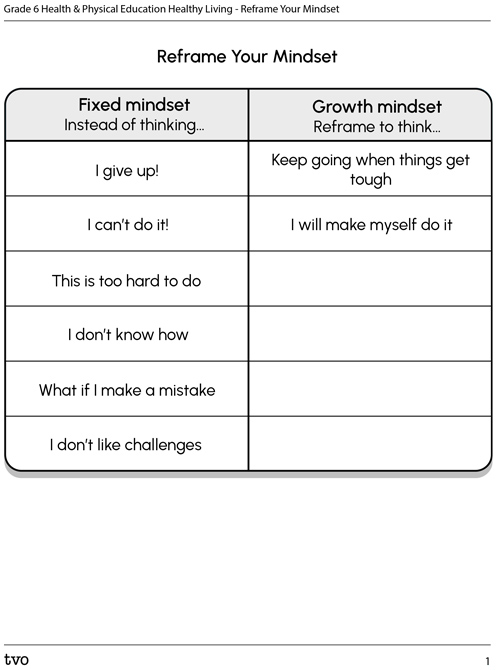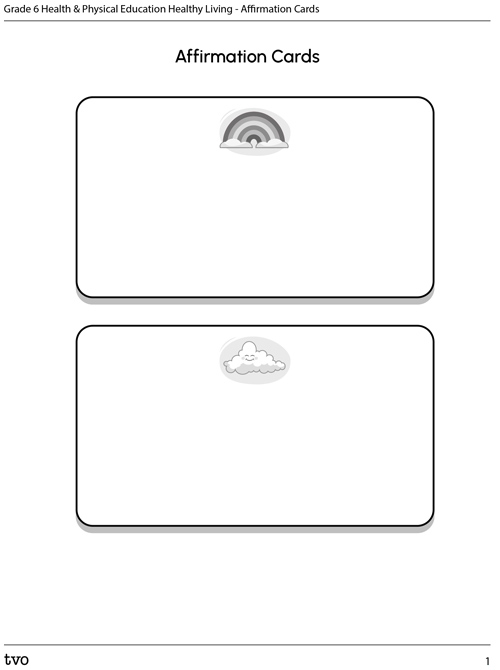Minds On
Half empty or half full?
Consider the following two glasses.
They both contain the same amount of water. However, one is labelled half full and the other half empty.
How do you interpret the glasses?

Pause and Reflect
Pause and reflect
What about the water in the glass affected your decision? What other factors might have influenced your decision?
Record your thoughts digitally, orally, or in print.
How we approach things, with either a negative or positive perspective, will have a direct effect on our mental health. It is important to understand the connections between our thoughts, our feelings, and our behaviours and how they can interact and influence each other.
Action
What’s your mindset?

Learning to take care of our mental health involves learning skills that are practised and develop over time. In any given situation, thoughts and feelings can impact behaviour and how we respond.
Having a growth mindset allows a person to have confidence that they will make it through. They may make mistakes but that is an opportunity to learn. A fixed mindset is the opposite. It causes a person to believe that nothing will work out and that they don’t have the skills to succeed.
Press on the following tabs to learn more about growth and fixed mindsets.

Aspects of a growth mindset:
- embraces challenges
- shows persistence
- learns from criticism
- celebrates success of others

Aspects of a fixed mindset:
- avoids challenges
- gives up easily
- ignores feedback
- jealous of others
Reframe your mindset!
By identifying the difference between fixed and growth mindsets, we can begin to change our thinking and recognize that positive thoughts have positive results.
Consider the following fixed mindset statements. How can they be changed to reflect a growth mindset? Some examples have been given.
| Fixed mindset Instead of thinking… |
Growth mindset Reframe to think… |
| I give up! | Keep going when things get tough |
| I can’t do it! | I will keep trying my best |
| This is too hard to do | |
| I don’t know how | |
| What if I make a mistake | |
| I don’t like challenges |
It’s your turn. Change the negative talk to positive talk!
Reframe the fixed mindset statements in the fillable and printable Reframe Your Mindset document. You can also complete this activity using another method of your choice.
Practise positive thinking

Learning to take care of your mental health involves learning skills that are honed through practise and that develop over time. It is important to understand the connections between our thoughts, our feelings, and our behaviours and how they can interact and influence each other.
In any given situation, our thoughts and feelings can impact our behaviour and how we respond. Let’s say, for example, that you overhear some friends talking about going to the park together. You haven’t been invited to join. Imagine how this scenario could play out – both with a positive outcome and with a less positive outcome.
When you overhear this, your first thought might be, ‘Hey – why wasn’t I invited? They don’t like me.’ Your feelings could be hurt, and you might either withdraw and feel bad or do something like talk about those friends in a negative way. Or, your first thought might be, ‘Oh, great – we’re going to the park.’ You would just assume that you’re included. That thought would lead to feeling excited about going to the park after school, and you’d do it!
Pause Reflect
Pause and reflect
What strategies can you use to counter negative thoughts so that you can better manage your feelings and actions and reach a more positive outcome?
Record your thoughts using a method of your choice.
When to ask for help

Negative thinking isn’t the only concern we should consider. Sometimes people experience feelings that they are not able to manage on their own. Some people may struggle with different issues such as substance use and addiction.
When this happens, it is time to get help from a professional. There are people who are trained to provide support to those who are experiencing mental health problems or who have a diagnosed mental illness.
Talking with someone about problems can help us consider things from different perspectives. Sometimes we need to get help to deal with stress and to cope. It can be hard to know where to turn. This checklist is a good place to start.
Support checklist
Consolidation
Positive affirmations!

A great way to remind people to have a positive mindset is by using affirmation cards. Affirmations are positive statements that help to motivate you through the day.
Choose five positive statements and design affirmation cards in digital, audio, or print format.
Here are some sample statements:
- I choose to start today with a smile!
- I am proud of myself.
- I am capable.
You can complete your cards using the following fillable and printable Affirmation Cards document.
Reflection
As you read through these descriptions, which sentence best describes how you are feeling about your understanding of this learning activity? Press the button that is beside this sentence.
I feel…
Now, record your ideas using a voice recorder, speech-to-text, or writing tool.

